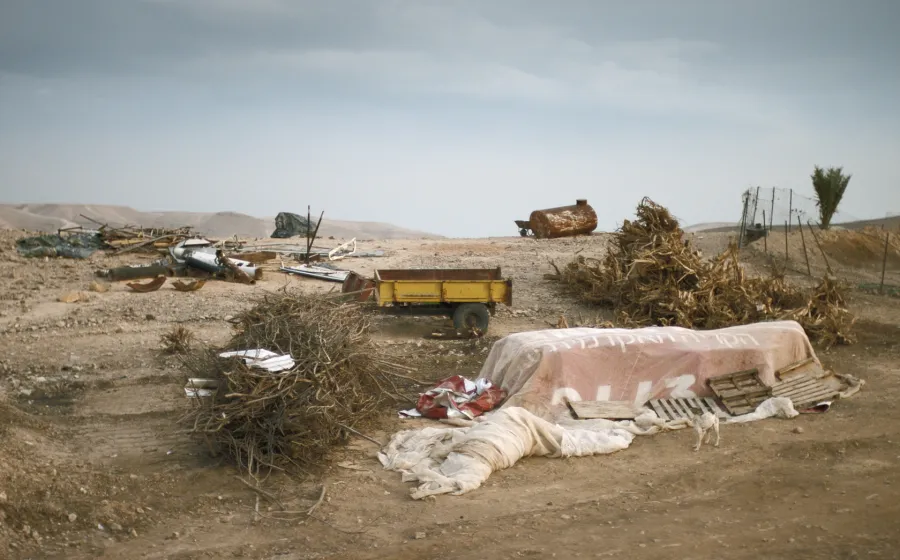Date
Venue
Price
Free access
Category
Format
Institution
Through film, sculpture and writing, Berlin-based Palestinian artist Jumana Manna delves into the paradoxes inherent in the act of preservation in the fields of music, agriculture and law.
The three films that make up Preservation Paradox [Conservar y sus contradicciones], question the rhythms and infrastructures promoted by capitalism and the horizons of transformation dictated by modernity. Her interest in structures of reciprocity and mutual support, and systems of exchange; give meaning to her work, not only by revealing themselves as a means of resistance to a monetary and vertical organization, but also as opposition to who holds the ultimate expression of sovereignty when it resides largely in power and the ability to dictate who can live and who must die (Mbembe, 2019).
Foragers (64 min, 2K video, 2022) is a hybrid documentary-fiction, tracing the precarious practice of foraging for wild edibles in Palestine/Israel. Shot in the Golan Heights, the Galilee and Jerusalem, Manna probes the impact of Israeli laws that classify 'akkoub (a thistle-like plant that tastes similar to artichoke) and za'atar (thyme) as endangered species and thereby criminalizes their collection in the wild. Such restrictions have resulted in fines and trials for hundreds of Arabs caught collecting these native plants, central to the Palestinian cuisine. For Palestinians, these laws constitute an ecological veil for legislation that further alienates them from their land while Israeli state representatives insist on their scientific expertise and duty to protect.
The film Wild Relatives (64min, 2K video, 2018) introduces us to other ways in which plants and seeds defy modern ideas of order, law, and borders. As described by the artist herself: the film examines the complex relationships of human bodies, plants and landscapes within hierarchies of power. Wild Relatives follows in 2017, the journey of seeds across different geographies, from the Svalbard Global Seed Vault in the Arctic, nicknamed the “doomsday vault,” to the International Center for Agricultural Research in the Dry Areas (ICARDA), currently based in Lebanon. ICARDA’s main activities are breeding hybrid seeds and maintaining a genebank coming from a significant collection of seeds gathered from small farmers and the wild. In 2015, ICARDA created headlines by making the first withdrawal from the Global Seed Vault as a result of the war in Syria, which restricted access to their research center in Aleppo. As Manna films between Svalbard and the Bekaa Valley of Lebanon, she encounters various actors within the economies of production, preservation, and displacement, opening up the hierarchies of labor involved in the duplication of these seeds. Wild Relatives captures disjunctures between the large- scale international initiative and its local implementation in the Bekaa Valley—carried out primarily by young migrant women. In so doing Manna highlights the scientific limitations in recovering the loss of biological life, especially when it is managed by governing bodies that are complicit in its elimination.
A Magical Substance Flows into me (66 min, HD video, 2016), is Manna’s first feature film on archival practice put in relation to sensorial experience. Manna breaks new ground on a reductionist picture of Palestinian history. In the film, Manna follows in the footsteps of Dr. Robert Lachmann, a German-Jewish ethnomusicologist who in the 1930s created a radio program for the Palestine Broadcasting Service called "The Oriental Music Broadcasts"; in which he invited members of local communities to perform their vernacular music.
Manna revisits these communities: Kurdish, Moroccan, and Yemenite Jews, Samaritans, members of the Palestinian rural communities, Bedouins and Coptic Christians; replaying Lachmann’s recordings and making new recordings of her own. In following Lachmann' footsteps, Manna films the remnants of a historical Palestine from which possible futures open up through a political imagination.
Jumana Manna’s body of work goes beyond any binomial preserve / erase, segregation / separation, loss / recovery ... Through her films, she develops a whole universe of nuances that emerge from the ambiguities that characterize our present, as a way to continue to respond to history. She does so in a masterful, humorous and serene tone, backed by in -depth research that the artist then shapes in the form of art works and text, generating and expanding a body of work that portrays the complex relationships of life forms in a ruinous present.

